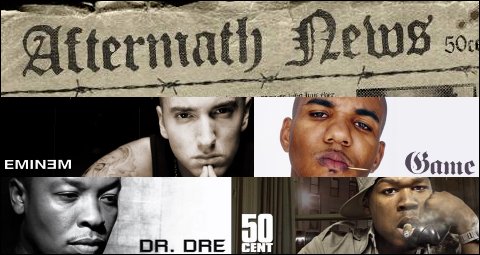March 14, 2005
Dr. Dre's Protégé Formula: The Secret to Aftermath's Hip-Hop Success

Brendan Koerner broke it down for us in a fascinating analysis on Slate.com of the secret to the success Dr. Dre's formulated at Aftermath Entertainment in grooming protégés like Eminem and 50 Cent to supa-MC-dom... The Game appears to be next up.
-
Dre isn't just consistently good—he's good in a consistent way. No matter if the front man is 50 Cent, Eminem, The Game, or Dre himself, the man's sound is similar from album to album. Dre achieves this by working with up-and-coming talents rather than established MCs who might want too big a say in how the album turns out. Dre was attracted to The Game because of his gangster persona and laid-back vocal style, but a more important factor might have been the young rapper's willingness to subordinate his technique to the Dre formula—the beats come first, and the lyrics are dessert. Meanwhile, ego clashes recently scuppered planned collaborations between Dre and Rakim, and Dre and Ice Cube.
Dre also realizes that once he's created a star, he can no longer exert his preferred level of control. Which may be why he rewards his former protégés with labels of their own (Eminem has Shady Records, 50 Cent has G Unit). It gives them something to do, which frees him up to look for more pliable talent. The end result? A sound that's so consistent the industry's hype artists can bank on it. Magazines and clothing companies can be confident that the pre-release capital they spend plugging Dre's protégés is a safe bet—sort of like buying hip-hop's version of municipal bonds.
When it comes to winning this kind of free, pre-release exposure, Dre has one last trick up his sleeve: He keeps himself scarce. Contrast the Dre approach with that of more prolific beatsmiths. The Neptunes, for example, rent themselves out as hired guns so often that a new Neptunes-produced track is certainly no cause for an XXL cover story. Dre, on the other hand, rarely takes on freelance work for non-Aftermath artists, preferring to keep his creative focus on projects he controls completely. Since 1998, only five albums can truly be considered pure Dre projects—the first two releases from Eminem, the debuts of 50 Cent and The Game, and his own 2001. The scarcity of Dre's work ensures that each release is an event, one that garners lavish media and consumer attention. And as music snobs are forever complaining—and the inexplicable success of Ashlee Simpson's Autobiography proves—exposure is what really propels an album to No. 1.
Ah, yes... invoking the name of Ashlee "Appetite for Humiliation" Simpson in the same piece as Eminem and 50 Cent... what's the world coming to? Still, the lesson of "if you love it, let it go" in constructing a hip-hop dynastic family network serves as an interesting model for spinning off success in promising new acts.
One the rest of the business world might well learn from... step up to get your rep up.
- Arik
Posted by Arik Johnson at March 14, 2005 07:10 AM "Competitive Intelligence applies the lessons of competition and principles of intelligence to the need for every business to gain awareness and predictability of market risk and opportunity. By doing so, CI has the power to transform an enterprise from also-ran into a real winner, with agility enough to create and maintain sustainable competitive advantage."
"Competitive Intelligence applies the lessons of competition and principles of intelligence to the need for every business to gain awareness and predictability of market risk and opportunity. By doing so, CI has the power to transform an enterprise from also-ran into a real winner, with agility enough to create and maintain sustainable competitive advantage."
